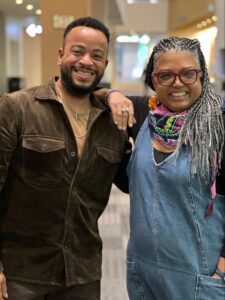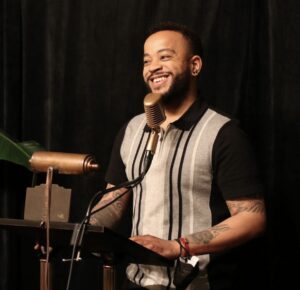From NCTE’s Standing Committee on Global Citizenship
This post was written by NCTE member Darius Phelps, who is also a member of the Standing Committee on Global Citizenship. As Committee members, we have discussed how we can utilize our narratives as emancipatory testimonies to carve the pathway to emancipation for this new generation. Poet, 2023 recipient of the NCTE Early Career Educator of Color Award, Assistant Director of Programs under The Center for Publishing & Applied Liberal Arts (PALA) department at NYU, and Brooklyn Poets manager, Darius amplifies the legacy of the late icon bell hooks, her groundbreaking narrative poetry, lasting legacy on the field of English education, and impact on people of color in academia.
It has taken me 15 years to truly understand and embrace my purpose and my power as a male educator of color. The awakening for me was cultivated by fostering an intimate connection with the work of bell hooks during my first year in the PhD program at Teachers College, Columbia University, brought to my attention by Dr. Marcelle Mentor in one of her courses I was fortunate to take my first year. There are many lessons I have learned from the late icon—many of them that I will pass down to my children and their children after I am long gone, especially when it comes to embracing vulnerability as a man of color.
Honestly, it was not her feminist scholarly work, nor her often cited Teaching to Transgress or All About Love, it was her poetry, which she mentions in depth in her stunning memoir, Wounds of Passion, that changed my life. bell details how writing truly saved her life with the following quote:
“Writing is my passion. Words are the way to know ecstasy. Without them life is barren. The poet insists, language is a body of suffering and when you take up language you take up the suffering too. All my life I have been suffering for words. Words have been the source of the pain and the way to heal. Struck as a child for talking, for speaking out of turn, for being out of my place. Struck as a grown woman for not knowing when to shut up, for not being willing to sacrifice words for desire. Struck by writing a book that disrupts. There are many ways to be hit. Pain is the price we pay to speak the truth.”
― bell hooks, Wounds of Passion: A Writing Life
In her work, but specifically in Wounds of Passion and Bone Black: Memories of Girlhood, bell shares intimate details about her home and what led her to embark on the search for belonging. Besides my mother, I have never had a woman in my life, especially one of color, who has and continues to encourage me to use my vulnerability as my superpower the same way that bell does with her work, building an empire with her own passion and pain through writing poetry. bell has taught me that my past does not define me but it instead frees my pain and brings me back to my true self. Using writing as a vessel, I have found a place where I let my emotions soar from the very psalms of my heartstrings.
I’m going back to Georgia where my trauma makes sense
(After Danez Smith)
O’ Georgia, don’t you know the crescent moon is only God’s thumbnail
if you learn to give your worries unto him? I’m over the monadnocks
i have laid amongst their ridges and valleys; bathed in their red clay, praying for peace.
i know I am strange, too much darkness satisfies my appetite to be loved
at least in this land where the leaves always fade back to gray
i know something that doesn’t die can’t be beautiful.
Have you ever stood on solid ground, Georgia?
the heavens above you, the cotton candy clouds & lavender skies—a field of innocence
all demanding to be the moon, everything around you
is darkness & it’s encapsulating & if you stay too long, it will consume you.
it’s so sad, you know? you’re the only familiar thing for miles
the only thing that refuses to truly shine.
—Darius Phelps
What bell teaches us is to be our authentic selves, live out our lives diving into the core of our pain, our traumas, and sitting with that truth so we can be reborn as our best selves, letting our narratives be emancipatory testimonies. When I think of the current state of academia, and the recent rise in the attacks on faculty of color, specifically women of color, I wonder what bell would have to say about all of this. Grounding myself in her practices, I am reminded of her feminist and pure teachings—honoring and embracing our queens for who they are, who they will continue to be—and assuring that we lay flowers at their feet while they are still here. Our world is currently burning as our children gasp for air. What we need now, more than ever before, is radical love.
Habits of the Heart
This heart is one that cannot be taught how to beat, how to be.
From the moment we are conceived,
there is imminent passion flowing like a wildfire
through our veins before these bodies
are even whispered a name.
The womb serves as a vessel
from fertilization to an embryo
The flame only grows stronger as our mothers
whisper words of affirmation
Psalms of dedication
Coveted prayers
Hymns from the heart
It is through them that we learn our own habits
Rooted in their unconditional love
from the very start.
—Darius Phelps
 At the helm of this movement—this rebirth and renaissance—is the one and only Dr. Marcelle Mentor. With the passion, the pain, and the poetry of bell hooks rooted in her calling, in my eyes, she is a resilient, empathetic, and perceptive educator who lights up any room she enters. Her work is rooted in doing what I call “the heart work,” which requires a disposition of allowing yourself to grow and evolve alongside students. Marcelle is also very dedicated to the faculty in her program and department. Marcelle is often seen as a role model to all of her students, but specifically to those international students who left their homes to come to New York City to pursue their Master’s and teaching degrees. Using her own story as an emancipatory testimony, Marcelle left her world behind and migrated to the USA from South Africa in 2005 to pursue a PhD. Her forthcoming contribution, “A Place Where Souls Can Rest: Black Girl Freedom, Liberation, and Emancipation” in Black Girls and Love in Education: bell hooks and Pedagogies of Love, as well as her published scholarly work reveal her commitment to scholarship and teaching the next generation of educators, including myself.
At the helm of this movement—this rebirth and renaissance—is the one and only Dr. Marcelle Mentor. With the passion, the pain, and the poetry of bell hooks rooted in her calling, in my eyes, she is a resilient, empathetic, and perceptive educator who lights up any room she enters. Her work is rooted in doing what I call “the heart work,” which requires a disposition of allowing yourself to grow and evolve alongside students. Marcelle is also very dedicated to the faculty in her program and department. Marcelle is often seen as a role model to all of her students, but specifically to those international students who left their homes to come to New York City to pursue their Master’s and teaching degrees. Using her own story as an emancipatory testimony, Marcelle left her world behind and migrated to the USA from South Africa in 2005 to pursue a PhD. Her forthcoming contribution, “A Place Where Souls Can Rest: Black Girl Freedom, Liberation, and Emancipation” in Black Girls and Love in Education: bell hooks and Pedagogies of Love, as well as her published scholarly work reveal her commitment to scholarship and teaching the next generation of educators, including myself.
On the path to true healing, you cannot avoid rebirth—either we burn ourselves or we take down innocent ones running from our truths. In this academy, there are those that do the work, and there are those who reap the benefits. As a PhD candidate and as a scholar of color, you essentially need someone who not only sees you but respects the path that you’ve chosen to embark on. bell was and still is a mentor, an icon, and a renaissance woman. On this journey that I am currently on, I am grateful to have my own renaissance woman, colleague, friend, and sister walking this path toward liberation with me. She has given me a place where my soul can truly rest, and that is so rare, especially in academia.
There is no better way to honor those we’ve lost than to amplify their creations and share their narratives. Marcelle does not beg for a seat at the table, instead, like bell before her, she creates her own and invites those to share their truths, break bread, and start a renaissance rooted in radical love.
“Only love can heal the wounds of the past. However, the intensity of our woundedness often leads to a closing of the heart, making it impossible for us to give or receive the love that is given to us.”
—bell hooks, All About Love: New Visions

Darius Phelps is a PhD Candidate at Teachers College, Columbia University, and 2023 recipient of the NCTE Early Career Educator of Color Award. He is the Assistant Director of Programs under The Center for Publishing & Applied Liberal Arts (PALA) department at NYU and is a manager at Brooklyn Poets. An educator, poet, spoken word artist, and activist, Darius writes poems about grief, liberation, emancipation, and reflection through the lens of a teacher of color and experiencing Black boy joy. His work and poems have appeared in the School Library Journal, NY English Record, NCTE’s English Journal, Pearl Press Magazine, ëëN Magazine, and many more. Recently, he was featured on WCBS and highlighted the importance of Black male educators in the classroom.
The Standing Committee on Global Citizenship works to identify and address issues of broad concern to NCTE members interested in promoting global citizenship and connections across global contexts within the Council and within members’ teaching contexts.
It is the policy of NCTE in all publications, including the Literacy & NCTE blog, to provide a forum for the open discussion of ideas concerning the content and the teaching of English and the language arts. Publicity accorded to any particular point of view does not imply endorsement by the Executive Committee, the Board of Directors, the staff, or the membership at large, except in announcements of policy, where such endorsement is clearly specified.

